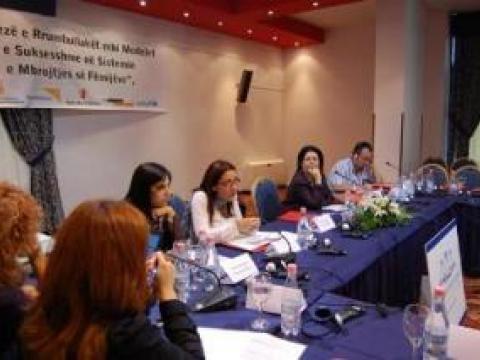Spotlight on child protection in Albania reveals need for greater investment

Even though Albania has around 17 Child Protection Units and 6 Child Right’s Units across the country, Child Protection still needs a great deal more resources and investment “... it is very important to achieve good coordination between Child Protection Units and local and central government so that we can reach children in need quickly and efficiently”, said Miranda Basha who represented the ministry at the discussion.
According to UNICEF, 1 in 2 Albanian children experience physical violence at home and 1 in 3 at school. UNICEF also reports that 13.3% of children attending school experience sexual abuse.
1 in 2 Albanian children experience physical violence at home and 1 in 3 at schoolUNICEF also reports that there are an estimated 280,000 children from poor families that are vulnerable to social exclusion–a figure that is much higher compared to the rest of the population.
“An area that we need to focus is early identification and prevention of child protection cases. This is better for child safety and the best development of children and family in Albania,” said Sendrine Constant, Head of Mission of Terre des Hommes, at the roundtable.
“Child Protection Units play a very important role in reaching out to children, because they are the first structure that the community refers to for child protection issues and from there the issues are addressed in the local and central government level,” said Ridiona Stana, Acting Child Protection Manager for World Vision in Albania.
World Vision has advocated and supported in opening of three CPUs in its Lezha Area Development Programme, located two hours northeast of the Albanian capital city, Tirana. World Vision has also provided training and has lobbied on the importance of the units at the local and national level.
The CPUs in Lezha are now known within the community and residents go directly to them to address issues around child abuse. Among its successes, the unit has solved more than 20 complex child protection cases since opening in 2007.
Already, different awareness-raising activities and ongoing advocacy about child protection issues in Kurbin, an hour northwest of Tirana, has seen increased support by the community and local government, which are now financing the operation of the CPU there.
An area that we need to focus is early identification and prevention of child protection casesThe successful models presented at the roundtable all reflected close collaboration between local and central government, community and with the families involved. As a result, good collaboration between these structures brings more effectiveness in solving child protection issues.
“I think that this roundtable achieved the promotion of the legitimacy of the CPU structure in Regional and Local level from the Ministry of Labor, Social Issues and Equal Opportunities. It has also raised awareness through models shared on the necessity of CPUs at the Regional and Local level,” concluded Ridiona Stana.
The Child Protection sector at World Vision works alongside communities to advocate for an environment in which children are protected from violence, abuse, discrimination and in which their rights are respected.
As a coalition with the BKTF network (Together Against Child Trafficking), World Vision is advocating to improve the well-being and protection of children by empowering them to raise their voices about their rights.
Recently, as part of BKTF coalition, World Vision advocated in parliament for a new law concerning children. For the first time Albania will have a specific and a complete law for the issues that are related to children. In the same time, this low will provide the legal basis for the good functioning of the CPUs and their coordination in a local and national level.
As importantly, Albanian children themselves are now saying ’no’ to abuse and other related problems and they are becoming agents for change.
An example is the participation of street working children who are helping to implement a World Vision project called the Life project, which began in 2008. Children and youth are actively involved in designing, organising and developing activities that address their key challenges and priorities.
Throughout Albania children have been part of World Vision’s Peer Educator groups where they learn to become leaders and pass on leadership skills to their peers by becoming active in asking for their rights to be respected.
-Ends-